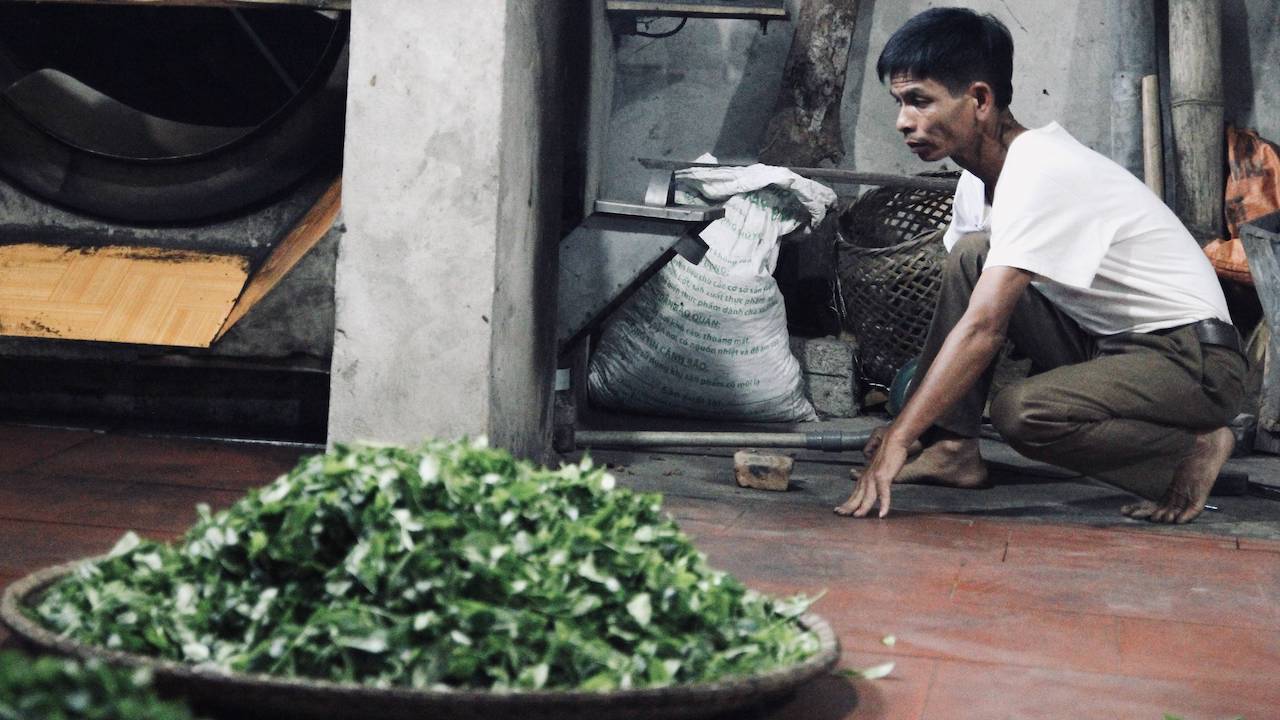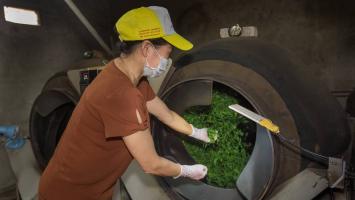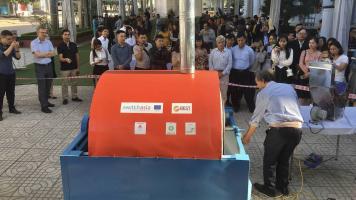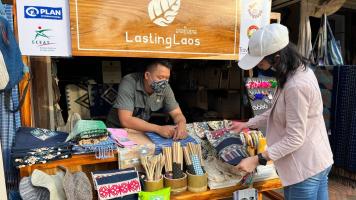
Biomass gasification is a technology that burns wastes into oxygen to produce heat-generating syngas or green fuel. Photo credit: Courtesy of the SWITCH-Asia Biomass Gasification Technology—Sustainable Energy Solution for Agri-Food Processing and Waste Management in the Rural Areas of Viet Nam.
EU-backed SWITCH Asia project helps to green tea production while boosting farmer income.
This article was first published by SWITCH-Asia.
With 23,000 hectares of production area, more than 100 craft villages, 110 cooperatives and 43 processing enterprises, and about 91,000 self-processing production households, tea is considered a critical agricultural industry in Thai Nguyen, Viet Nam, bringing income to thousands of families.
The tea-drying process, where processors use heat to dry leaves slowly, is the most crucial step in transforming fresh tea buds into commercial dried tea for consumers. However, this stage releases a large amount of smoke, toxins, and carbon dioxide into the environment, especially when most local small-scale production households still use wood-burning and charcoal-heating devices. Additionally, smoke, dust, and toxins from burning wood also pose health risks to tea producers.
"When using firewood as fuel for drying tea with the traditional heating device, my eyes are always stinging because of direct contact with dust and smoke," said Dang Ngoc Ha, whose family has been making tea for more than 40 years in the Dinh Hoa district in Thai Nguyen. "That would emit a lot of smoke, causing unsatisfactory finished products which would be discarded. The constant exposure to such an environment also causes coughing, breathing difficulties, stinging eyes when sleeping... which affects my family's health greatly," said Ha.
A safe and less polluting option
Producing high-quality tea which is safer for producers and significantly less polluting is currently the main concern for Ha and many other tea producers in Thai Nguyen.
Project SnapshotThe EU SWITCH-Asia BEST project implemented by Oxfam and non-government organization Center for Creativity and Sustainability Study and Consultancy in Viet Nam promotes the application of continuous volumetric biomass gasification technology among micro and small enterprises. The project is implemented in four provinces, namely, Lao Cai, Thai Nguyen, Tuyen Quang, and Yen Bai. This initiative expects to support 1.2 million people (50% of whom will be women) as direct beneficiaries with 2,500 agricultural processing micro and small enterprises applying VCBG technology as their primary energy source. This should lead to the gasification of 1.4 million tons of biomass and contribute to a reduction of 2 million tons of carbon dioxide emissions in the four provinces. |
In 2018, Ha and his wife initially had access to waste-to-fuel volumetric continuous biomass gasification (VCBG) technology, with the support of Oxfam in Viet Nam and the Center for Creativity and Sustainability Study and Consultancy (CCS), a non-governmental organization based in Hanoi. His family is now operating the VCBG equipment improved by the EU SWITCH-Asia BEST project (Biomass Gasification Technology—Sustainable Energy Solution for Agri-Food Processing and Waste Management in Rural Areas of Viet Nam).
Biomass gasification is a technology that burns biologically derived materials without oxygen to produce heat-generating syngas or green fuel. Consequently, the amount of smoke and dust emitted is almost zero.
"The biomass gasification heating device is the same size as the traditional ones with just a few differences in its operations. However, during the burning process, I was surprised at the zero-smoke emission. The dried tea is neither stale nor dusty, and is of good quality," said Ha. "Most importantly, the fuel for burning is chopped wood. This source of biological waste is easy to find in the locality at a low cost, causing no increase in the selling price of our tea products."
Using waste sources
Vu Thi Thu Huong, vice-president of Thai Nguyen Cooperative Alliance, agrees that the operating mechanism of the VCBG equipment is highly suitable for local conditions.
Thai Nguyen is a midland mountainous region with abundant forest products. Since many traditional villages are working on wood processing, the amount of waste is tremendous. A survey that was conducted earlier, shows that many forestry cooperatives leave tens of tons of waste, which occupies a large amount of space. If left for a long time, the rot will cause more pollution.
"Using waste sources from agriculture and forestry in tea processing not only helps solve environmental problems but also generates a large number of jobs in stages such as processing, chopping fuel, and mechanical production and operation. A beneficial ecosystem for three linking chains: biomass suppliers, mechanics, and processing micro and small enterprises will also be established," shared Huong.
By improving livelihoods and contributing to environmental protection, it is possible for VCBG to be commercialized for sustainable impact in localities.
Ha considers the use of VCBG technology as suitable for family-owned tea production. The technology also helps improve household income. "When processing tea with biomass gasification technology, we could sell the final product for three or four times more. The drying time is reduced by half, hence productivity increases. The waste from the burning process could then be used as biochar to grow flowers and vegetables. Most importantly, I could feel the cleaner air and see the improvement in the health of the whole family."
This year, Ha's tea products made with the biomass gasifier achieved three stars for quality after being tested in the province. The tea products also won the "Typical Industrial Product" award from the Trade Promotion Center, Department of Industry and Trade of Thai Nguyen province.
Ha now actively promotes his teas at local shows under the One Commune, One Product program which aims to bolster rural economies.
"Any household producers who want clean, high-quality tea products will absolutely want to know about the biomass gasification technology… People who already know about this technology will be excited and less stressed with their health concerns."
This article was first published by SWITCH-Asia on 30 September 2021.

SWITCH-Asia
The SWITCH-Asia program, launched in 2007, is part of the European Union’s strategy to promote sustainable consumption and production (SCP) in Asia. As of 2023, it covers 42 countries in Asia, the Middle East, and the Pacific, targeting emerging economies and major CO2-emitting countries.


